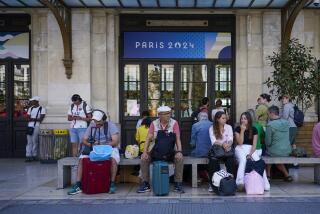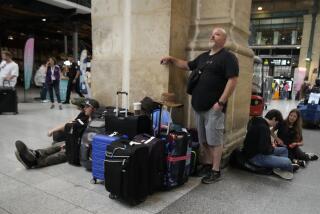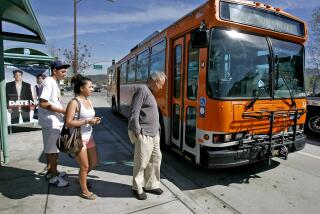S. African Rail Service Disrupted as Train Cars Are Set Afire for 3rd Day
JOHANNESBURG, South Africa — Commuter trains were set afire at eight railroad stations in and around this city on Wednesday in the third day of arson attacks that authorities have linked to a five-week-old strike by 22,000 black workers against the state-run railroad system.
Ten trains, packed with passengers, pulled into suburban stations with two or three cars in flames Wednesday afternoon, according to railway officials, and two empty trains were set afire in the main marshaling yards in central Johannesburg just before the evening rush hour. Trains at most other stations were halted when electrical power was shut off to permit firemen to fight the blazes.
Although damage was extensive, only one injury was reported, that of an unidentified white man hit by a stone thrown at a passing train, according to the government’s Bureau for Information.
Replacing Strikers
The South African Transport Services accused members of the striking South African Railway and Harbor Workers Union of setting the fires and endangering the lives of passengers and staff, and officials said preparations are being made to dismiss the strikers and replace them, perhaps with unemployed whites.
“Stronger action will have to be taken to curb and prevent these actions,” Bart Grove, the Transport Services general manager, said in a statement, adding that the government is determined not to permit the strike to develop into further civil unrest here.
Heavily armed riot police guarded stations and other railroad facilities in Soweto and rode most of the trains between the city and the outlying black ghettos Wednesday while combat troops patrolled on foot and in armored cars.
Police searching for arsonists who had torched two cars rolling out of Johannesburg reportedly detained a trainload of more than 1,000 passengers for questioning Wednesday afternoon on the outskirts of Soweto. Most were later released.
Dispersed With Tear Gas
Tear gas was used at another station northeast of Johannesburg to disperse a crowd of about 2,000, according to the Bureau for Information, and shots were reported fired during an incident at a third station, east of the city. Information officials provided no further details.
The spreading violence threatened to break the relative calm that has prevailed in recent weeks in most of the black townships around Johannesburg, and government officials were clearly apprehensive about a new wave of civil unrest that, this time, might involve workers rather than students.
(This article has been written in conformity with government regulations that largely restrict reports of civil unrest to information provided by the Bureau for Information and other official sources. The regulations prohibit first-hand reporting of any political violence, of security force actions to deal with it or of what the government deems to be “subversive statements.”)
Much of the railway service to Soweto, the sprawling black ghetto southwest of Johannesburg, has been suspended since the first arson attacks on nine trains Monday evening and subsequent attacks on more trains Tuesday. Those trains that continued to run from Soweto’s outskirts were at least 50 minutes late Wednesday morning.
With most trains unable to get out of Johannesburg on Wednesday evening, lines of travelers waiting for buses and taxis stretched for nearly a mile at several depots, and Soweto’s main roads were filled with lines of men and women returning home on foot, singing “freedom songs” as they trudged along.
White rail commuters, for the first time, were also forced to find alternative transportation. Much of the arson directed at the black trains occurred at key stations through which many of the trains bound for the white suburbs west of Johannesburg must pass.
Union leaders, rejecting the government’s charges of responsibility for the three days of arson attacks, warned at a press conference Wednesday that they will extend the strike nationwide and broaden it to include other industries if workers are dismissed.
The key to resolving the strike peacefully, the labor leaders said, is for the government to stop dealing with a company union and begin negotiating with the Railway and Harbor Workers Union, an affiliate of the militant, 650,000-member Congress of South African Trade Unions.
Eli Louw, the government’s transport minister, had refused earlier to deal with the new union, accusing it and the trade union federation of attempting to transfer the country’s political crisis from the townships to the workplace, merging political and economic demands and attempting to escalate labor unrest.
Postal Strike Talks Stall
Negotiations, meanwhile, broke down Wednesday in a second strike by black government employees, this one by 4,800 postal workers who have closed all the post offices in Soweto and reduced mail deliveries in many areas of Johannesburg.
Like the Railway Workers Union, the new Post and Telecommunications Workers’ Assn. wants management recognition and negotiations on a variety of issues involving working conditions. A union precondition for any talks, however, is the release of two of its leaders detained without charge by police under the country’s state of emergency.
Driver Disciplined
The railroad workers’ dispute began with disciplinary action against a driver who allegedly was late turning in $20 in revenues that he had collected and who then sought union support for his reinstatement.
“The climate of violence that has developed around the strike has been created by the Transport Services’ intransigence backed up by the actions of the police,” Jay Naidoo, general secretary of the Congress of South African Trade Unions, said. He added that the union is ready to go to court to prove that it is not responsible for the violence, in which nearly 60 railway cars have been destroyed.
“The Railway and Habor Workers Union and the Transport Services workers have been the target of systematic attacks, as is always the case when we are involved in an important struggle challenging the status quo,” Naidoo said. More than 400 union members have been arrested in the past two weeks on charges of holding an “illegal gathering” and of intimidating workers not on strike.
“If they do dismiss the striking workers, this could lead to escalation on a national level,” Naidoo continued, “and if this does happen, industries across the country could get caught in the crossfire.”
In Cape Town, the Rev. Allan Boesak, moderator of the Dutch Reformed Mission Church and a leading anti-apartheid campaigner, appeared at a rally organized by the United Democratic Front coalition of anti-apartheid groups and urged his listeners to campaign for release of the country’s political detainees--despite new regulations that prohibit such protests.
Will Organize Demonstrations
Boesak, in what seemed to be a calculated act of defiance, said he would personally organize demonstrations and distribute posters and bumper stickers calling for the detainees’ release rather than accept further limitation of his own political rights.
The three-hour rally, attended by about 650 people, was organized on half an hour’s notice in Cape Town’s city hall after a special three-judge panel lifted a police ban on the gathering, one of the few that the United Democratic Front has been able to hold under the 10-month-old state of emergency.
More to Read
Sign up for Essential California
The most important California stories and recommendations in your inbox every morning.
You may occasionally receive promotional content from the Los Angeles Times.










